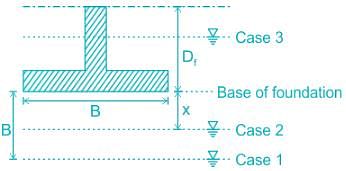Test: Effect of water table - Civil Engineering (CE) MCQ
10 Questions MCQ Test Foundation Engineering - Test: Effect of water table
When the water table is above the base of the footing, the submerged weight ‘γ’ can be used to compute __________
When the water table is close to the ground surface, the bearing capacity of a soil is reduced to
| 1 Crore+ students have signed up on EduRev. Have you? Download the App |
The equation Nc = (Nq – 1) cot φ, have been adopted by ___________
Which of the following term does not contribute to q f?
In the Bowl’s method for finding the effect of water table, which of the following factor is used for soil in the wedge zone?
The value of Nc and Nq are same for, which of the following methods?
Which of the following is an essential difference between Vesic’s and Hansen’s procedure?
Which of the following N factors has the widest range of values?
Meyerhof’s extended the analysis of plastic equilibrium of a surface footing to __________
The factor N γ(M) identifies which of the following author?
|
18 videos|46 docs|27 tests
|
|
18 videos|46 docs|27 tests
|






















